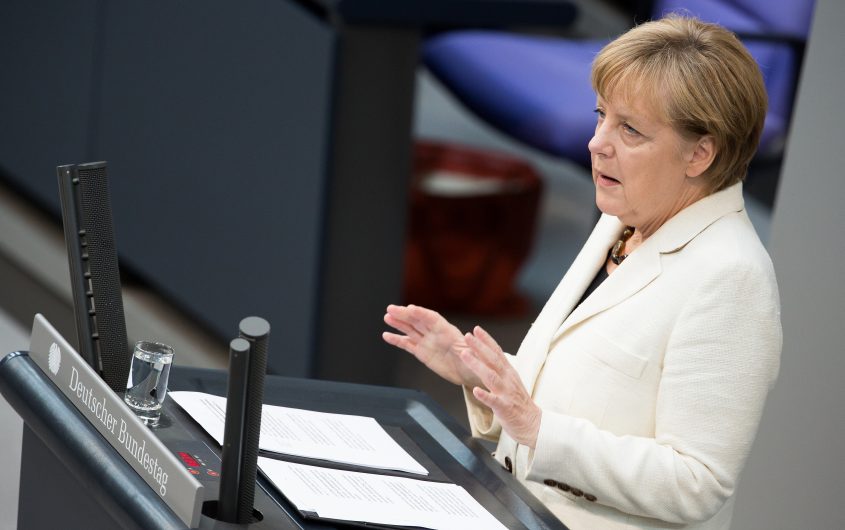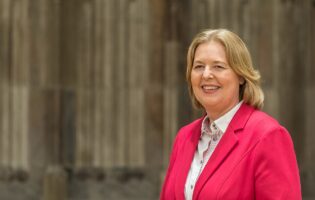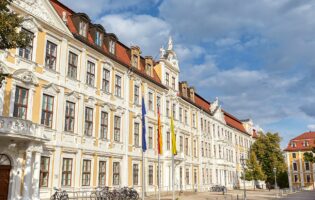
Tobias Koch via Wikimedia Commons
Merkel and the Transformation of Gender Politics in Germany

Joyce Mushaben
University of Missouri - St. Louis
Joyce Marie Mushaben is a Curators’ Professor of Comparative Politics and former Director of the Institute for Women's & Gender Studies (2002-2005). Fluent in German, her teaching centers on comparative public policy, the European Union, women's leadership, citizenship, immigration, mega-cities and sustainability issues. Her research covers new social movements, youth protest, German unification and identities, gender, ethnicity and welfare issues, EU migration and integration studies.
Her books/monographs include Identity without a Hinterland? Continuity and Change in National Consciousness in the German Democratic Republic, 1949-1989 (1993); From Post-War to Post-Wall Generations: Changing Attitudes towards the National Question and NATO in the Federal Republic of Germany (1998); The Changing Faces of Citizenship: Integration and Mobilization among Ethnic Minorities in Germany (2008); and, Gendering the European Union: New Responses to Old Democratic Deficits (co-edited with Gabriele Abels, 2012). Her latest book focuses on Becoming Madam Chancellor: Angela Merkel and the Berlin Republic (2016). Her articles have appeared in World Politics, Polity, West European Politics, German Politics, German Politics & Society, the Journal of Peace Research, Democratization, Politics & Religion, Citizenship Studies, Journal of Ethnic & Migration Studies, German Law Review and Femina Politica. A past president of the German Studies Association (USA), she has also served on the Executive Boards of the International Association for the Study of German Politics and the German Studies Association, as well as on selection committees for Fulbright, the German Academic Exchange Service and the American Council of Learned Societies. She is a current Editorial Board member for German Politics & Society, German Politics, and Femina Politica.
Having received a 1999 Trailblazer Award and the Chancellor's Award for Excellence in Research Creativity in 2007, Mushaben is a three-time Alexander von Humboldt Fellow, a former Ford Foundation Fellow, German Marshall Fund grantee and DAAD recipient. She has held guest-scholar posts at the Academy for Social Sciences (GDR), the Center for Youth Research (GDR), the Chinese Academy of Social Sciences and the Center for Transdisciplinary Gender Research (Berlin). She was named the first Research Associate in the BMW Center for German & European Studies at Georgetown University, has enjoyed Visiting Professorships at the Ohio State University, Berlin’s Humboldt University, the Missouri-London Program and at the Universities of Erfurt, Stuttgart and Tübingen (Germany) , inter alia. Affiliated with the American Institute for Contemporary German Politics (Washington D.C.) and a designated Fulbright Specialist, she is commonly known as "Dr. J."
In contrast to her male predecessors, Angela Merkel declared in the early 1990s that she would not wait to become a political shipwreck before withdrawing from politics.[1] She announced her decision not to seek the chancellorship for a fifth term with her usual calm, dignified demeanor on October 29, 2018. Having allied herself with Kohl’s Christian Democratic Party, Merkel was rarely perceived as a representative of Eastern German interests, nor did she portray herself as such. She was equally reluctant to characterize herself as a feminist.
Excluded from unification negotiations, women were devastated by the elimination of legal abortion and a plethora of targeted social benefits. Given countless conflicts among different schools of western feminism (liberal, socialist, radical-autonomous, womanist) over the years, FRG activists were too busy critiquing the patriarchy, and each other, to pursue pragmatic, single-issue coalitions.[2] Frustrated by cultural misunderstandings, both sides retreated to their separate niches within a few years after unification, feeling betrayed on both sides.[3] [4] Catapulted into the Kohl Cabinet as the Minister for Women and Youth in 1990, Merkel understood the resentment her appointment provoked, realizing that she would be “damned if she did, damned if she didn’t” identify with one brand of feminism over the other.
Can one woman really make a difference? I argue that despite her Christian-Democratic affiliation, Merkel has done more to foster equality than all previous German chancellors combined. Re-elected for the fourth time in 2017, she has managed different coalition configurations, often complicated by partisan and personality conflicts among male cabinet members. The fact that she may have had non-feminist motives for introducing gender-sensitive policies does not detract from the real, everyday improvements engendered by her reforms.
Merkel’s “35 years in the waiting room of democracy” equipped her with a unique skill set. Her GDR socialization through the 1950s and 1960s, her work as a physicist in the 1970s and 1980s, and her political re-education in the FRG’s alpha-male party arena after 1990 have rendered her an effective leader. Her Protestant upbringing as a pastor’s daughter in a godless state fostered a strong commitment to human rights and freedom-of-movement norms. Her employment experiences under a socialist gender regime and her post-GDR antipathy toward confrontational, ideological positions factored into her leadership style, while the physicist was clearly at work in matters of program design and evaluation. Her east-to-west re-acculturation influenced policy substance, although she increasingly leaned towards SPD/Green preferences, e.g., regarding nuclear energy and climate change.
More pro-natalist than egalitarian in nature, the GDR gender regime helped women to reconcile work-and-family obligations but did nothing to redefine the gender division of labor—the focus of Western feminists. Eastern women enjoyed “emancipatory” policies their FRG counterparts lacked: free contraception, legal abortion, generous maternal leaves, comprehensive child-care, access to non-traditional professions, and even a paid monthly “house-cleaning” day. This explains Merkel’s inability to view women’s paid employment and subsidized care facilities as radically “feminist” demands. She built bridges between the two populations by grafting new all-German policies onto old roots. The EU-mandated reconciliation policies she introduced after 2005—aided by another “non-feminist,” Ursula von der Leyen—resembled GDR policies eliminated by unification.[5] Her mixed motives rallied new stakeholders, like employers hit by labor shortages: she combined gender equality with concerns about a major demographic deficit and the need to improve job opportunities for offspring of migrant descent. Ironically, a substantial part of the GDR gender regime has become “the new normal.”
Merkel has done more to foster equality than all previous German chancellors combined.
In 2008, Merkel’s first Grand Coalition granted youngsters over three a right to child care, extended to cover one-year-olds in 2013, the same year she declared that real equality will only be achieved “when both men and women change their roles and behaviors.” As of 2015, both parents can split or share 36 months of paid leave after birth or adoption, up until a child’s eighth birthday. These new guarantees combined have induced the country’s first Baby Boom since 1964, triggering midwife and pediatrician shortages. While average child-bearing ages among easterners have risen from 24.6 (1990) to 29.2 (2019, versus 30 in the west), so has the all-German care-ratio for preschoolers (3-5): 94.2 percent east, 92.7 percent west; the rates for toddlers under 3 are 52.1 percent and 30.3 percent, respectively.[6]
Gender roles are changing: The share of men taking parental leave rose from 3 percent in 2009 to 36 percent in 2015, reaching 462,000 (averaging 3.7 months) in 2020. Experts claim that the rate could reach 50 percent—if women and men were paid equally. Paternal take-up rates hit 30 percent in Sachsen, with 27.2 percent in Berlin and Bayern (2020); 552,000 parents (57.8 percent in Jena) took advantage of the lower-paid Elterngeld Plus. Roughly 60 percent of parents with toddlers under 3 believe that men and women should share family and household responsibilities: 78 percent (east) and 57 percent (west) support “reconciliation” policies.”[7]
By 2018, over 71 percent of all German women engaged in paid labor, 12 percent more than in 2005. Prior to the Covid pandemic, women once again comprised 49.3 percent of the eastern workforce. The gender pay gap persists, with a 7 percent disparity among east women, 22 percent among western females. Still denied wage parity (85 percent of western salaries), eastern women nonetheless accrue higher pensions, due to more years of full-time work. Women involuntarily confined to part-time jobs saw a 7 percent pay increase under the 2015 minimum wage law. Employment among mothers rose from 60 percent (2006) to 67 percent (2016), and from 32 percent to 44 percent among those with children under two; 43 percent of eastern mothers work full time (36+ hours per week), compared to 20 percent in the old Länder. Four-fifths of eastern single mothers work at least 28 hours per week, versus 59 percent in the west. Easterners perceive EU-mandates on family–work reconciliation and advancing women in STEM fields as a return to familiar GDR policies. For western women, these are new substantive rights, marking a great leap forward towards equality.
Merkel’s legacy falls along three main axes. First, her sixteen years of steering the ship of state have provided a definitive answer to the larger democratic question: Who is “fit to rule” Germany? The answer: Ohne Frauen ist kein Staat zu machen (No state can be made without women). After single-handedly knocking Kohl off his throne in 1999, she quickly advanced to the top of the CDU ladder, leading the Opposition during seven years of SPD-Green government. When male rivals denied her the right as Party Chair to compete for the Chancellorship in 2002, she beat them at their own game, by making a deal with Stoiber and ousting Friedrich Merz from his post as Parliamentary Caucus leader. Though subject to different “learning curves,” her female allies, especially Ursula von der Leyen and Annegret Kramp-Karrenbauer, accrued successful records on their own. Von der Leyen introduced significant gender-equality reforms in three ministerial domains, despite strong Union-internal resistance, before her surprise promotion to EU Commission President. Kramp-Karrenbauer secured the CDU‘s first outright majority in Saarland, introducing state work-family reconciliation policies, prior to her hotly-contended election as national party chair.
Initially opposing quotas of any sort, the chancellor revised her position after the Euro crisis (caused by men and banks behaving badly), accepting mandatory 30 percent targets in 2014, though she recently blocked a tougher 40 percent EU regulation. The 2017 Bundestagswahl featured four eastern “lead-candidates”: Sahra Wagenknecht (Die Linke), Katrin Göring-Eckardt (Bündnis 90/Greens), Frauke Petry (AfD), und Angela Merkel.[8] The subsequent TV “Elephant Round” included two eastern party co-chairs, Katrin Göring-Eckhardt and Katja Kipping (Die Linke). Women comprised over 40 percent of her first three Cabinets.
Marking the 100th anniversary of female suffrage in November 2018, the Chancellor declared: “Progress towards equal rights, equal status, and equal treatment took and still takes too long… Quotas were important, but the goal has to be parity—parity everywhere, whether in politics, in the economy, in administration, even in science as well as in cultural domains.”[9] The 2021 elections feature another female chancellor candidate, Annalena Baerbock (Bündnis 90/Greens), as well as SPD lead-candidate Franziska Giffey in Berlin’s mayoral race; even the AfD has a female lead, Alice Weidel. Die Linke now have two female co-chairs, Janine Wissler (Hessen) and Susanne Hennig-Wellsow (Thüringen). Malu Dreyer (SPD) was elected for a second term asMinister-President of Rheinland-Pfalz in 2013, while Manuela Schwesig is up for reelection as Minister-President of Mecklenburg-Vorpommern this fall. While generational change has certainly induced more women to aspire to powerful positions, Merkel’s long march through the institutions has unlocked many political doors for other women.
Coinciding with the Merkel era, eastern women are outpacing western women and their male compatriots in reaching the top, despite the glaring underrepresentation of easterners (1.7 percent) among all FRG elites. In 2019, three of four eastern Supervisory Board members (out of 193) in 30 DAX-listed corporations were female, versus one woman for every ten western men. Women comprise 2 percent of the individuals leading 100 of the largest western companies, compared to 9 percent among the top 100 eastern firms. In 2020, Ines Haertel became the first easterner to assume a seat on the Federal Constitutional Court, marking the first time women have outnumbered men on that body (9 to 7).
Merkel’s second major contribution to the Berlin Republic has been her successful modernization of the CDU itself. Many policies adopted during her four terms in office directly repudiate those of her erstwhile mentor, Helmut Kohl. The list includes the withdrawal from nuclear energy, the adoption of reconciliation policies and corporate quotas, advancing LGBTI rights, and proactive migration/asylum reforms. Blocked by Chancellor Schröder, Merkel’s first Grand Coalition adopted the General Equal Treatment Act in 2006, creating a federal office to monitor discrimination. Her 2007 National Integration Plan liberalized residency, job training, and work rights, even for “rejected” asylum seekers (before the 2015 refugee crisis). Although she personally opposed the 2017 Marriage for All Act, she allowed CDU parliamentarians to vote their conscience, securing a majority for its passage; it was accompanied by a liberal transsexual-rights law. She impelled the CDU/CSU to break with its Kinder-Küche-Kirche (children-kitchen-church) philosophy and initiated programs to increase female/minority presence in MINT (Mathematik, Informatik, Naturwissenschaften, Technik) fields.
Though some feminists still find it hard to accept the fact that a CDU Chancellor could serve as an extraordinary role model across the political spectrum, many younger women have been inspired by her leadership.
Presiding over the 2017 G-20 summit, Merkel was the first world leader to include the “Women-20 Dialogue” recommendations in the official G-20 Conclusions, calling for female economic empowerment worldwide. She now admits that she encountered sexist treatment and anti-easterner stereotypes during the Kohl years, usually from fellow conservatives. She maintained her calm demeanor and wry humor in the face of openly derogatory labels (e.g., Kohls Mädchen, Ossie-Biene mit der Pokermiene), even in darker times (Schwarze Witwe; Königsmorder). Nor did she flinch facing the 2005 campaign mockery of “Kan(n)-di-dat?” you-tube caricatures, and efforts to downplay her power as “Mutti Merkel.” Though male pundits still criticize her at every level, they no longer comment on her clothes, her hair, or her cleavage. Having been designated the “World’s Most Powerful Woman” twelve times has proven to be a very effective shield against explicitly sexist attacks.
Less recognized at home, but much appreciated abroad, Merkel has moved Germany from the regional theater onto the global stage. Compared to other EU states, her honest, data-driven approach to multiple crises has kept the national economy on track, despite a global pandemic. While Germany’s export and job boom prior to the COVID outbreak had begun to mitigate the grossly unequal distribution of wages and opportunities across the older and younger Länder, it will take another decade of major investment to overcome the “structural weaknesses” exacerbated by Treuhand privatization and corruption. Her 2009 campaign poster sent a formidable message to women: Wir haben die Kraft, while her favorite phrase, Wir schaffen das, brought a long-overdue can-do spirit to the German political arena, in no way limited to the refugee crisis.
As an outsider who has lived and researched in Germany for over forty years, l argue further that Merkel has created a new foundation for women’s identification with “the nation.” Women, in general, and feminists, in particular, have always had a difficult relationship with a historically “difficult fatherland.” Merkel has tried to persuade Westerners that they, too, have many positive reasons for identifying with united Germany. As she observed in 1993, “we Germans have a very cramped relationship to the question, whether we are allowed to love our homeland. Especially in the old federal states (sic). It does not help us to advance, to act as if we have no connection to our country and don’t even trust ourselves enough to say that we feel at home here.”
Though some feminists still find it hard to accept the fact that a CDU Chancellor could serve as an extraordinary role model across the political spectrum, many younger women have been inspired by her leadership. For those born after 2000—this year’s first-time voters—Merkel is the only Chancellor they have ever known. As many have personally admitted to me, even socially liberal women have supported her reforms by voting for the CDU, if only temporarily. I think Jana Hensel (born 1976) has said it best:
My Germany-feeling is, in truth, an Angela-Merkel-feeling. I have been raised in this feeling, like others would be in a house. I have lived in it, taking it for granted like a child. Over the years it has become like a second skin. Isn’t that what we call home?… Her “We can do this” sentence is the greatest compliment that she could have paid us. She has given us Germans a bit of her greatness and dignity as a charge in exchange. And we will be able to do this, now without her.[10]
As a feminist scholar and gender-parity-seeking U.S. citizen, I will likewise miss Angela Merkel a great deal after September 2021.
Notes
[1] Koelbl, Herlinde, Spuren der Macht. Die Verwandlung des Menschen durch das Amt (Munich: Knesebeck, 1999).
[2] Mushaben, Joyce Marie, “Feminism in Four Acts: The Changing Political Identity of Women in the German Federal Republic,” Peter Merkl, ed., The Federal Republic at 40 (New York University Press, 1989): 76-109.
[3] Miethe, Ingrid, “Dominanz und Differenz. Verständigungsprozesse zwischen feministischen Akteurinnen aus Ost- und Westdeutschland,” In: Schäfer, Eva, Ina Dietzsch et al., Irritationen Ostdeutschland: Geschlechterverhältnisse seit der Wende (Münster 2005): 218-234.
[4] Rohnstock, Katrin, Hg., Stiefschwestern: Was Ost-Frauen und West-Frauen voneinander denken (Frankfurt/Main: Fischer,1994).
[5] Lang, Sabine, “ Gender Equality in Post-Unification Germany: Between GDR Legacies and EU-Level Pressures,” German Politics 26, No. 4 (2017): 556-573.
[6] Kopplin, Martin, “Frauen in Ost und West: Angleichung nach drei Jahrzehnten?,” Bürger und Staat 1-2/2020: 71-80, p. 74.
[7] Frankfurter Allgemeine Zeitung, “Zahl der Männer in bezahlter Elternzeit leicht gestiegen,” March 25, 2021.
[8] Hähnig, Anne, Martin Machowecz, Jana Hensel, Patrik Schwarz, Bundestagswahl2017: Vier gewinnt, Die Zeit, 2. März 2017.
[9] Rede von Bundeskanzlerin Merkel bei der Festveranstaltung „100 Jahre Frauenwahlrecht“ am 12. November 2018.
[10] Hensel, Jana, “Mein Angela-Merkel-Gefühl,” Die Zeit, 30. Oktober 2018.
Further Bibliography
Bock, Jessica, “Kein einig Schwesterland. Über die bestehende Un-Einigkeit zwischen ost- und westdeutscher Frauenbewegung,” Femina Politica 2/2019: 121-130.
Hensel, Jana, “Interview: ‘Parität erscheint mir logisch,’” Die Zeit, 27. Januar 2019.
Maleck-Lewy, Eva “Between Self-Determination and State Supervision: Women and the Abortion Law in Post-Unification Germany,” Social Politics (1995): 62–75.
Mushaben, Joyce Marie, Becoming Madam Chancellor. Angela Merkel and the Berlin Republic (Cambridge UK: Cambridge University Press, 2017).
Mushaben, Joyce Marie “Concession or Compromise? The Politics of Abortion in United Germany,” German Politics 6, No. 3 (December 1997): 69-87.








